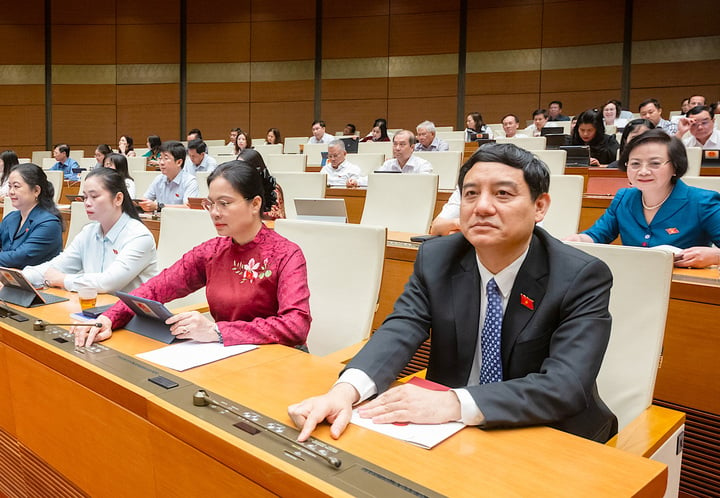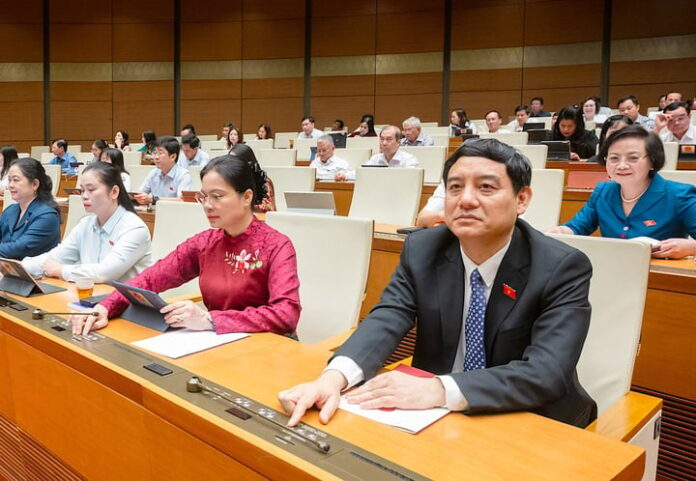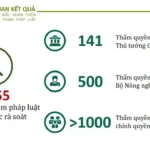The National Assembly has just passed the Law on Teachers with an overwhelming majority of 451 out of 460 delegates (94.35% of the total delegates). This is the first specialized law that comprehensively regulates the legal position, rights, obligations, and policies for teachers. The law consists of 9 chapters and 42 articles and will come into effect on January 1, 2026.
In his report presented before the National Assembly’s approval, Chairman of the Committee for Culture and Society, Nguyen Dac Vinh, affirmed that the draft law does not prohibit extra classes. Instead, it stipulates that teachers must not “coerce students to participate in extra classes in any form,” addressing the issue of rampant extra classes.
According to Mr. Vinh, the requirement for teachers not to teach extra classes to students they are directly teaching is already stipulated in the Ministry of Education and Training’s circular on extra classes.

Delegates voting to pass the Law on Teachers this morning.
Another notable new feature in the recently passed Law is the policy on salaries and benefits for teachers.
Specifically, teachers’ salaries are ranked highest within the administrative salary scale. They are also entitled to preferential allowances and other allowances depending on the nature of their work and region.
The Law on Teachers stipulates that teachers in kindergartens, teachers working in ethnic minority, mountainous, border, and island areas, and those in particularly difficult socio-economic conditions will enjoy higher salaries and allowances than their counterparts in more favorable conditions.
For teachers in non-public educational institutions, salaries will be implemented according to labor laws.
Additionally, according to the Law, teachers will also receive various special allowances, responsibility allowances, incentives, regional allowances, education integration allowances, seniority allowances, and mobility allowances, among others, to comprehensively improve their income.
The Law on Teachers expands support policies, including providing housing or rent subsidies for teachers in particularly difficult areas, offering periodic health allowances and training for all teachers regardless of their institution type, and giving priority in recruitment, transfer, and acceptance for teachers working in remote and border areas. It also aims to attract highly qualified and skilled individuals to teach, especially in strategic fields such as science, technology, digital transformation, and vocational education.
Kindergarten teachers can opt for early retirement up to five years earlier without a pension reduction if they have at least 15 years of social insurance contributions. On the other hand, professors, associate professors, doctors, or teachers in specific fields can retire at a later age to retain talented individuals.
The Law also unifies the two systems of standards (professional titles and professional standards) into a single system of professional titles linked to professional competency standards, uniformly applied to both public and non-public sectors.
This move aims to create a common quality standard for the entire teaching staff, ensure equal access to quality education for students, and enhance transparency and accessibility in evaluating, selecting, and training teachers.
The Law on Teachers also grants autonomy to the education sector in recruiting and employing teachers. It entrusts the Minister of Education with the authority to regulate the recruitment of teachers in kindergarten, general education, and continuing education institutions.
Delegating authority to the education sector in teacher recruitment and employment is a significant step towards addressing policy bottlenecks for teachers, particularly in solving the issue of teacher surplus and shortage, and enabling the sector to proactively plan and manage short-term, medium-term, and long-term strategies for teacher development.
The Jobless Benefit: A Safety Net or a Trap?
The Standing Committee of the National Assembly assessed that the unemployment benefit rate of 60% of the average monthly unemployment insurance contribution is relatively in line with international practices and the current provisions for benefits that workers receive upon job loss. Consequently, the amended Labor Law retains the existing provision regarding the unemployment benefit rate.
“Developing Tailored Mechanisms and Policies: Investing in the Evolution of Railway Systems.”
Under the adept stewardship of Vice Chairwoman Nguyen Thi Thanh, the National Assembly proceeded with its 9th session agenda on the morning of June 16th. The focus of this session was directed towards the presentation and deliberation of the proposed amendments to the Railway Law.
The Congress Passes Resolution to Amend the Constitution: County-Level Operations to Cease from July 1st, 2025
The National Assembly’s resolution to amend and supplement several articles of the 2013 Constitution stipulates the cessation of district-level administrative units across the country from July 1, 2025, onwards. Additionally, it affirms the status of the Vietnam General Confederation of Labour, the Vietnam Farmers’ Union, the Ho Chi Minh Communist Youth Union, the Vietnam Women’s Union, and the Vietnam Veterans Association as socio-political organizations under the umbrella of the Vietnam Fatherland Front.














































